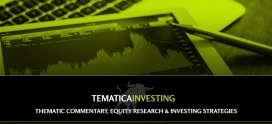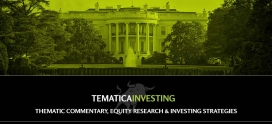Amid Tariff Noise and Market Uncertainty, We See Value in This Asset-Lite Stock
On Monday, I shared my view about the changing narrative that has hit the stock market as we closed the books of the first quarter of 2018 and turned the page and kicked off the second quarter of this year. Then, just this morning, I posted a follow-up as Trump’s tit for tat on those tariffs has escalated even further, only fanning the flames of uncertainty even further. You can read those comments by clicking here.
Amid all this uncertainty and volatility, the question likely on the top of your mind is what will we do here at Tematica Investing?
What we’ve always done – be prudent investors that listen to our thematic signals as we look for solid businesses to buy at favorable prices.
As I look across the current crop of holdings on the Tematica Investing Select List, I continue to see favorable outlooks for some of more recently added positions – Rockwell Automation (ROK) and Paccar (PCAR) for example – that have come under pressure along with the market these past weeks. When the market settles out, I’ll look to take advantage of the current pain to improve our cost basis. That strategy has served us well with Costco Wholesale (COST) shares and others in the past and I’m confident it will again.
With Facebook (FB), the bevy of privacy and user data concerns were once again kicked up with the announcement that Facebook CEO Mark Zuckerberg is now scheduled to testify before Congress next week. While we removed the shares from the Select List, one of the questions we’ll need to have answered is how does the company’s moves to address these concerns impact its revenue and bottom line? For now, this means Facebook is a show me story even as it continues to benefit from monetizing Instagram and its other properties.
And then more recently President Trump has turned his Twitter focus to Amazon (AMZN), the U.S. Postal Service (USPS) and how Amazon is being “subsidized.” That noise you just heard was me shaking my head in response.
I view this deal between Amazon and the UPSP as a struggling USPS cutting a deal to help it defray costs as it contends with the headwinds associated with our Connected Society investing theme — headwinds that Amazon is primarily creating. I’m only surprised that Trump hasn’t lashed out over how incompetent the USPS has been and how poor of a deal it inked. Let’s also not forget that Trump is less than pleased with his coverage in The Washington Post, which is owned personally by Amazon’s Jeff Bezos. Nevertheless, I see this only as a short-term distraction rather than a true threat to the many, many, many thematic tailwinds Amazon is riding.
Now let’s look at a new position for the Select List…
GSV Capital: A sleeper play on Spotify and Dropbox
Amid the market pain this week, a long-awaited day has finally arrived as streaming music service Spotify (SPOT) has become a publicly traded company. This follows the recent initial public offering of cloud storage company Dropbox (DBX). The former fits in our Connected Society investing theme, while the latter sits inside our Disruptive Technologies ones. While it’s not a strict rule, I tend to avoid newly public companies until after the lockup expiration period as it clears out a potentially large wave of insider selling that weights on the shares.
There is, however, GSV Capital (GSVC), which is a public company that gives “growth equity investors access to the world’s most dynamic, VC-backed private companies.” I see it as a public company that invests in private companies and looks to monetize its portfolio of holdings through either an IPO or other strategic exits such as an acquisition, and that fits rather squarely inside our Asset Lite investing theme.
For those that may not remember this particular theme, the Asset-Lite investment theme looks to capitalize on business models that leverage investments and intellectual property to generate what are typically large returns on relatively few capital assets, such as property, plant, and equipment.
A full list of the GSV’s top 10 investments can be found here, but as of year-end, 2017 Spotify accounted for 15% of GSV’s investment portfolio, while Dropbox was 8.7%. If we aggregate the investments across GSV’s investment portfolio, we would find that roughly 35% of its portfolio is centered on cloud computing and big data, which means it has meaningful exposure to our Disruptive Technologies theme. This edges out its position in education technology (Tooling & Re-tooling) and is followed by social/mobility, marketplaces, and sustainability at roughly 18%, 11% and less than 1% of the total portfolio.
Historically when holdings in GSV’s portfolio go public, it drives the company’s overall net asset value higher especially when those going public companies have been higher in profile like Spotify and Dropbox.
On March 22, Dropbox prices its IPO at $22 per share, and out of the gate, the offering was met with strong reception as the shares closed at $29 and have closed between $29.90-$31.25 ever since. Not all that surprising given the transaction was reportedly 25 times oversubscribed. The original price talk on the offering was far lower, in the upper teens. Viewed from the perspective of our GSV shares, the Dropbox offering was a success. Moreover, with consumers and corporations as well as other entities embracing the cloud, we see a bright future ahead for Dropbox, especially as it continues to take a page out of Alphabet/Google’s (GOOGL) playbook and pile on the features. In the coming days, we should get a swath of analyst coverage and odds are favorable ratings as well as price targets, especially from the underwriters – Goldman Sachs (GS), JPMorgan (JPM) and 10 others.
As I noted above, the news of the day, however, was the Spotify IPO and the shares opened up at $165.90 before closing at $149.01, roughly a 13% move higher in its debut. Unlike the Dropbox offering that was a traditional going public transaction, Spotify opted for a direct listing, which means there were no underwriters subsequently no price talk ahead of the opening trade. That said, in the private markets, Spotify shares were said to have been trading near $132-$133 ahead of the IPO – that’s how that 13% move higher was tabulated. And lest one think Spotify went solo on this endeavor, it was advised by Goldman Sachs, Morgan Stanley (MS) and Allen & Company. That likely means follow up research and favorable price targets.
Even if those three don’t follow through on that, which in our view is unlikely, we’ve already seen price targets in the $200-$220 range emerge from RBC Capital and MKM Partners with Guggenheim offering a $175 price target. Helping set the base for those targets, last week Spotify shared guidance for 1Q 2018 revenue to climb 22% year over year and for 2018 revenue guidance to climb 20%-30%. That sound you just heard was the air being let out of the Pandora Media (P) balloon as there is a far better play on streaming music services to be had as of today. Pandora’s only expected to grow its revenue some 3% this year.
The one wrinkle in the Spotify forecast is the company expects to deliver bottom-line losses, and while investors will likely want to own shares in the largest streaming music service globally – the Netflix (NFLX) of streaming music – over time we’re likely to see questions over when it will be profitable and deliver positive EPS crop up. That’s at least several quarters away, and the near-term focus over the next 6-12 months will be the company delivering subscriber growth. Again, similar to Netflix in its early streaming days.
When it comes to both Dropbox and Spotify, their market position in their respective businesses is enviable… so enviable in fact one has to wonder why Apple (AAPL) didn’t buy them several years ago. If Apple did, odds are iCloud and Apple Music would be very different animals today.
As I mentioned above, we look to invest in businesses that are benefitting from our thematic tailwinds. In looking at both Dropbox as well as Spotify, both are benefitting from the ongoing shift toward cloud and digital/streaming services. Both allow people access to content when they want it, where they want it and on the device of their choice. Inside GSV’s investment portfolio there are other holdings that are benefitting from our thematic tailwinds as well – Palantir, a big data analytics company, and asset lite company Lyft – both of which continue to move toward monetization events for GSV and their other investors.
Because GSV is an investment portfolio, looking at EPS and revenue is rather meaningless. Instead, the valuation methodology centers on the company’s net asset value (NAV) per share. Exiting the December quarter, the company’s net asset value stood at $9.64 per share, which means even before we include the move higher in Spotify and Dropbox shares, GSVC shares are trading at a 25% discount. Factor in the moves in both holdings and that discount is even wider, which offers compelling upside to $11, which is our price target based on post-transaction net asset value calculus. Should Spotify and Dropbox move higher, which I suspect they will over the longer-term, GSV’s NAV should move higher as well. Should other holdings go public, such as Palantir, that likely means more fuel to the NAV fire.
The bottom line on GSV Capital (GSVC)
- We are issuing a Buy rating and adding GSV Capital (GSVC) shares to the Tematica Investing Select List as an Asset Lite play with an $11 price target.




